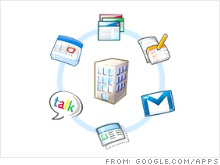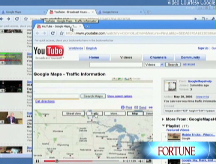The hidden cost of Google Apps
Cheap software can become pricey when the learning curve eats into your business's productivity.
(CNNMoney.com) -- What happens when a business throws out its scheduling and collaboration tools and replaces them with Google's low-cost, online business software? To find out, we at Blumsday migrated our entire shop of roughly a dozen employees and contractors to test out Google Apps.
Six months in, it's clear that Google Apps is remarkably powerful for collaboration in many ways that Microsoft Office is not. But, unfortunately for small businesses looking to stretch their IT dollars in these hard times, Google Apps is far from perfect.
If you have not at least taken a gander at Google Apps, please do yourself a favor and click here: //www.google.com/a. What you will find is the real deal, a "must know about" revolution in small business productivity software. Google (GOOG, Fortune 500) appears to have created a killer collaboration app for small businesses. Among the suite's many, many features: It enables groups to process documents, send and receive e-mails, schedule meetings, chat, and access centralized storage spots for critical company information.
It also enables collaboration on digital files in real time by all your employees - and if you wish, your customers. Google provides its service on the Web, so all your data is instantly backed up. It has marvelous integration with established office tools - its syncing feature for Microsoft Outlook, for example, was flawless in my testing. The schedule-a-meeting function on Google Calendar leaves Outlook's in the dust. Plus, all this information is available on any computer running a Web browser, and on most mobile phones with Web access. Just a few years ago, from companies like Microsoft, Oracle (ORCL, Fortune 500) or SAP (SAP), this technology would easily have cost tens or hundreds of thousands of dollars, if it were available at all.
Google gets even more credit for pricing these tools remarkably cheaply. Google Apps comes in two versions: Standard Edition is free, but ad-supported. Premier Edition runs $50 per account, per year - a fraction of the cost of the flotilla of software Microsoft (MSFT, Fortune 500) pushes on enterprises: Office, Windows, their various add-ons and all the Exchange and SharePoint servers needed to enable collaboration. (To be fair, Office's Word and Excel are unmatched by Google Apps; Google Docs is rudimentary and Google Docs Spreadsheet is simply awful compared to Excel 2007, which is just about the best program ever.)
So where does Google's excellent collaboration software go bad? Right at the login.
The essential problem with Google is also its great strength: It's a Web-based application, so access is entirely granted through password-based, online logins. And Google, because of its success, makes it diabolically easy to confuse passwords, logins and other Web data. Why? Well, think about it: Not only does your business have a Google account, but your employees probably have one of their own as well. So unless everyone has the proper Web addresses and associated logins down cold, disaster can ensue.
For example, if I use the browser Internet Explorer to log in to my personal Gmail account from the Google home page at google.com, I get to my jonathanhowardblum@gmail.com account just fine. But unless I am very careful, Internet Explorer will store my personal Gmail Web page location and log in. To find my Blumsday work account hosted by Google, I have to remember to start at www.google.com/a. That little "a" isn't a typo - it's the critical piece of information that differentiates my work login from the consumer Gmail product. Google uses the identical e-mail interface for hosted Google Apps accounts as it does for Gmail. If you're not paying close attention, it's easy to get mixed up about which account you're actually using.
The confusion gets worse if you share PCs. For three months, Google Talk was convinced that I was Nick, my assistant. We finally figured out that we had shared that test computer - he had once logged in as himself on the machine that I was now using, and logging in as myself to Google Apps hadn't cleared out that setting in the browser's memory. We had to fully wipe the cache to allow me to switch back to ... well, me.
Linda, my head of operations, had her personal Google Calendar account swapped for her business identity on my Google Calendar about the same period. Until we figured out the goof, she missed a bunch of meetings. And to this day, after more than six months of using Google Apps, I still get e-mail invitations addressed to Dan, our intern. Somehow, Google thinks I am him. He missed last week's meeting in part because he never got an invitation.
Google developers agree that managing identities can be a problem, but they say that the benefits of functioning at low or no cost, accessing your data anywhere, and living off the cloud of computers on the Web outweighs these problems.
"There is something in users getting comfortable with browser-based applications. That is true not just in the Google identity, but in any sort of browser," says Matt Glotzbach, Google Apps' product management director. "There are some changes in work behavior needed in using cloud-based computing. But the upside is tremendous."
The problem is that when you're running a business, you're paying your people while they struggle through this cultural shift to Web-based applications - and that can be very costly. Quantifying our spending on Google Apps has been tricky, but I figure I spend at least half an hour dealing with Google issues every day, some days more. Most of my people are messing around with it for about that long each day as well. Compared to other collaboration tools we have tested - Microsoft Outlook running on Exchange servers, Adobe's Acrobot.com, 37signals' Basecamp and others - we found Google to be a full step backward in its labor intensity.
Google was cheaper and easier to deploy, but it requires more direct handholding and ongoing maintenance. Right now, we're in the midst of a very not pretty, employee-by-employee identity checkup - which boils down to me remotely going into my workers' desktops to triple checking that all is set up as it should be. Google Apps is sexy, but it has a tendency to get confused. And debugging those crossed wires can be pain.
Some employees will flat-out not use the Google tools unless they absolutely have to. "My problem is that Google Apps is too damn complicated," says Seth, our Web editor. "I don't consider myself a technophobe, but I don't have the patience to wade through all the crap on there. Too many functions. Too much information I don't really need."
Bottom line: Google Apps can be a powerful tool, and it's something you must consider in these lean times. But I would definitely not attempt this migration without going for the paid Premier version of the service, which comes with added support and more functions. Plus, don't do this alone. You are going to need help from a dedicated Google expert in your shop. You can home grow that person - none of this stuff is hard. But not matter what, this is such a big shift, that you - not your Google Expert or anybody else - are going to have to drive the culture of change this product requires: Your people are going to have to get used to finding their own IT solutions. The traditional days of a help desk and little yellow order tickets are gone.
I did find a hidden, "tough love" upside with Google Apps. We are starting to holding regular sessions to keep everyone up to date on how Google works; and I found this time, while hard to find, is a great way to not only pay attention to my people and to feel them out for ideas, but also gave me a good indication of who really wants to be here and who does not. Constant change does have the advantage of driving the dead wood from the shop. If somebody is signaling they can't handle Google Apps, what else are they are not cut out for in the business?
Google is good, but it's not perfect. And if you're not very careful, it can really hurt you.
The Blumsday LLC staff contributed to this article. ![]()
Life at Basecamp - six months in
Four bosses, four cities: Software to manage long-distance relationships.
Why Macs still aren't right for most businesses
-
The Cheesecake Factory created smaller portions to survive the downturn. Play
-
A breeder of award-winning marijuana seeds is following the money and heading to the U.S. More
-
Most small businesses die within five years, but Amish businesses have a survival rate north of 90%. More
-
The 10 most popular franchise brands over the past decade -- and their failure rates. More
-
These firms are the last left in America making iconic products now in their twilight. More











